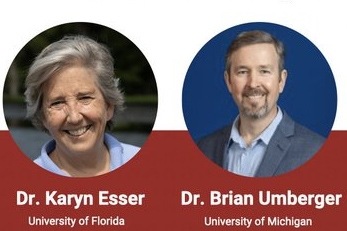The U of A Exercise Science Research Center's open house on Friday, Oct. 21, will include tours, a reception and dedication seminars featuring two distinguished speakers in the field, Karyn Esser and Brian Umberger.
The event is funded by the College of Education and Health Professions WE CARE initiative. WE CARE, an acronym for Wellness and Education Commitment to Arkansas Excellence, focuses on three priorities that revolve around tangible ways faculty and staff can collaborate within the college and across the state to address complex challenges in education and health.
The center, in the Department of Health, Human Performance and Recreation, recently added gait biomechanics and expanded its wet lab capabilities for work in muscle biology. Tours will begin at noon on Friday in the Health, Physical Education, and Recreation (HPER) building. At 1 p.m., the event will move to the Jerry and Gene Jones Family Student-Athlete Success Center for a reception and symposium.
The symposium will begin at 1:30 p.m. with a Zoom option.
Esser, Ph.D., is the associate director for basic studies at the University of Florida Myology Institute. Her lab pioneered research on the role of circadian rhythms and the molecular clock mechanism in skeletal muscle homeostasis and health. Esser is currently the principal investigator of multiple NIH-funded grant awards. She has been named chair of the recently integrated University of Florida College of Medicine Department of Physiology and Aging. Esser's talk is presented with partial support from the Arkansas Integrative Metabolic Research Center.
Umberger, Ph.D., is the program chair in movement science and director of the Locomotion Research Laboratory at the University of Michigan School of Kinesiology. He is a recent president of the American Society of Biomechanics, whose research focuses on bipedal locomotion, including gait disorders and the evolutionary basis for human bipedalism. He also holds affiliate appointments in the U-M Robotics Institute and the Michigan Institute for Computational Discovery and Engineering.
Renovations to the center were completed following the addition of two new faculty. Abigail Schmitt, Ph.D., runs the Neuromechanics of Human Movement Laboratory - or the "MOVE Lab." Her research focuses on helping people move in better or safer ways.
Kevin Murach, Ph.D., created the Molecular Muscle Mass Regulation Lab (M3R Lab), which helps people prevent muscle mass loss with age and improve muscle performance in health and disease through exercise.
The MOVE Lab is a new 3D motion capture laboratory designed for human locomotion research. It's equipped with 16 infrared cameras and three embedded force platforms to track human movement with sub-millimeter accuracy. The new space complements a second lab with an eight-camera motion capture system that measures postural control and human ergonomics.
The Exercise Science Research Center's wet lab space houses the primary research efforts for groups led by faculty, including Tyrone Washington, Murach and Nicholas Greene, interim director. The space was updated in 2014 with funding from the College of Education and Health Professions. With the addition of Murach, the new renovation expands the main laboratory space to approximately 1,700 square feet and almost 300 square feet of freezer space. This space now houses equipment and room for state-of-the-art approaches in molecular biology.
The center currently includes the research efforts of nine faculty and their teams. Research focuses on concussion; physical activity; thermoregulation and hydration; aging, sarcopenia and Alzheimer's Disease; muscle biology; and biomechanics.
Friday's event is presented with additional support from the Department of Health, Human Performance and Recreation.
Topics
Contacts
Shannon G. Magsam, Director of Communications
College of Education and Health Professions
479-575-3138,
